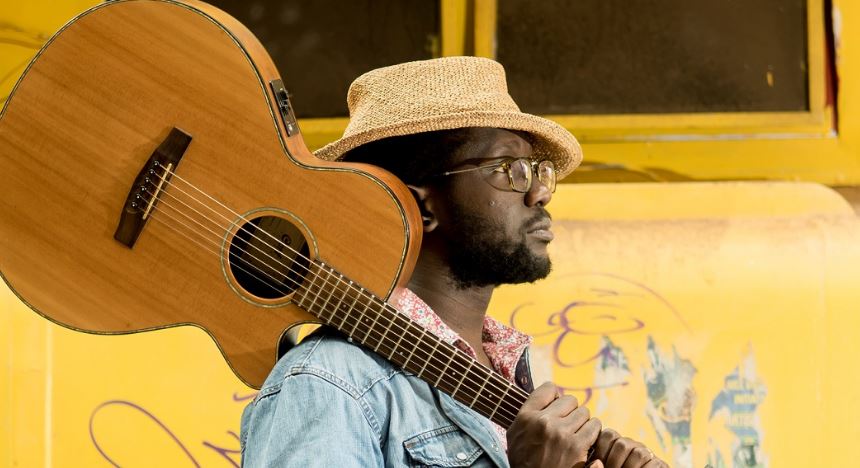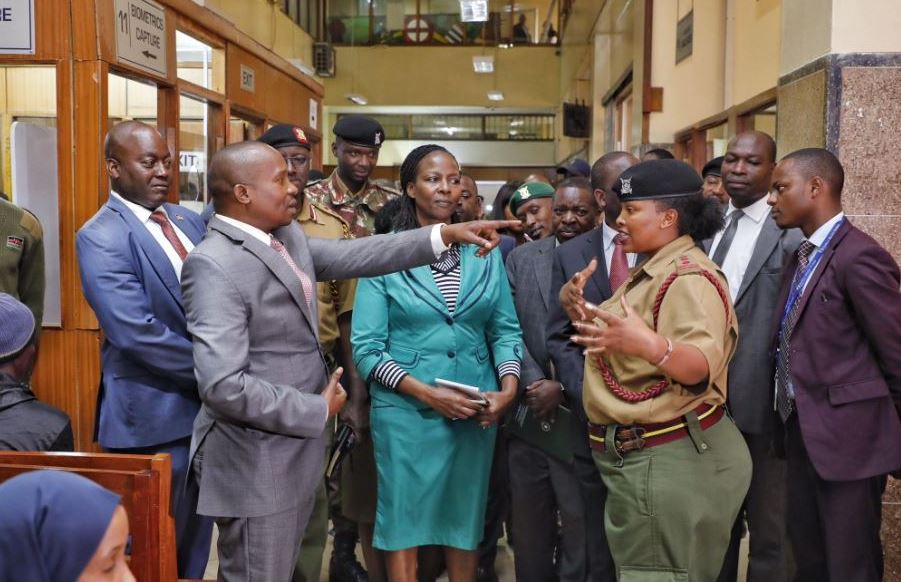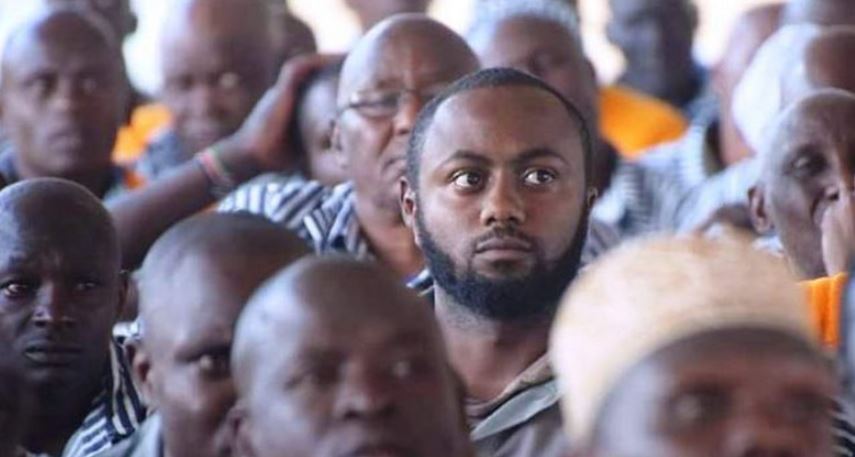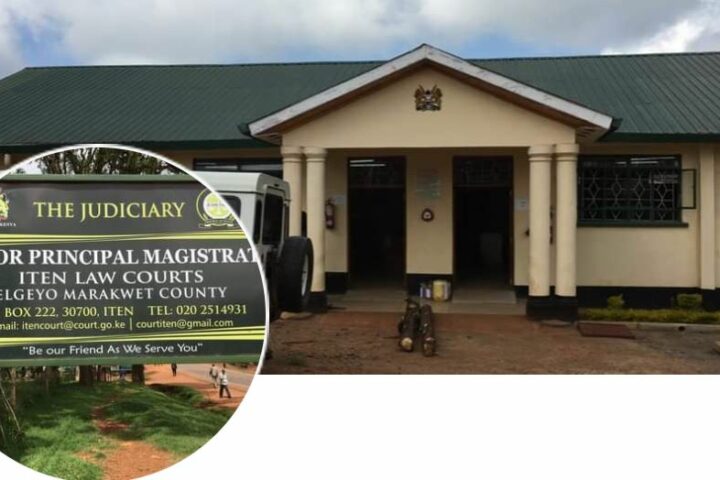
A Self-taught percussionist and guitarist, Tetu Shani got accepted in 2014 to the prestigious Berklee College of Music with a scholarship to study Performance. He, however, turned it down desiring to be a part of the musical renaissance happening in Nairobi and to help build up the local music scene.
He has since become an award winning singer-songwriter who currently describes his sound as Afro pop-rock, which is a blend of indie rock, Afro-pop and folkloric rhythms from Kenya.
Here’s his story.
Who is Tetu Shani?
A husband and a father, who is currently obsessed with sugarcane juice with ginger and lime, as well as caramel popcorn. Many people think I am West or South African, but Tetu Shani is a Maasai name.
What instrument did you learn to play first?
Djembe. It’s a West African percussion instrument. I actually taught myself each instrument I now play over time; the guitar, the drum set, and singing. You should have heard my singing in the past. Oh my days.
On that note, describe your music background.
My mum and aunts were part of a singing group, but I am the first person in the family to pursue music professionally; both from the paternal and maternal sides. I’m guessing it’s because no one in our family really knew who a musician is. I, myself, didn’t think that music is a big deal.
Did you get formal music education?
I almost did, at Berklee College of Music. I got a scholarship in 2014 to study Performance, but I turned it down because I wanted to be a part of the musical renaissance happening in Nairobi and to help build up the local music scene.
Who would you say are your musical influences?
Strangely enough, I don’t listen to a lot of music. People would expect me, being a musician, to listen to music 24/7. As a creator of music, I am very protective over the uniqueness of my craft. I realise that a lot of musicians sound exactly like their influences.
To understand this, I have to go five years back at a time Aa (Nigeria), Jack Johnson and Jason Mraz were my influences. There was a season where my influences were heavily funk like James Brown and Tower of Power.
There were also seasons of hip-hop, neo-soul and even reggae. It’s been very twisty and windy.
How would you describe your music?
It has gone through certain transformations. Starting out, I called it mood music, because my philosophy at the time was that every colour on the spectrum of emotion is a song.
I got back to Kenya in 2010, and people told me that Kenyans only listened to a particular type of music. Looking at the spectrum, this meant that Kenyans were only red and yellow, and sometimes blue. But I thought to myself that Kenyans probably listen to everything.
They only look for it outside when they cannot find its Kenyan version. I was focused on creating music that taps into different emotions. I then shifted to a season where I felt like I created troubadour music.
It was almost like one-man-guitar. I am currently at a season called Africa Sun, which is afro-pop with rock influences.
What image do you think your music conveys?
The image of a person who is sincere, honest, deep but silly and someone who has travelled. I grew up in Zambia, Mauritania, Senegal, Canada and the United States.
My music portrays the image of someone willing to take risks, and someone who is relatable.
What skills/personal attributes would you say have been important in your success story?
Resilience. It’s a rough scene in any career in Nairobi. There is that competitiveness. I sometimes think that those who make it in Nairobi are not the most gifted, but simply those who last longer than everyone else.
What best live performance experience have you had?I would say a performance I did in J’s on April 17.
Any performance where I think the audience is one is amazing to me. Someone once said, ‘the reason why we go to concerts is to stop feeling like one person, a human, and to feel like humanity’.
There’s nothing like the feeling of seeing a crowd singing the same words or moving the same way. As Kenyans, we keep forgetting that the purpose of concerts is to bring us together.
How do you handle mistakes during a performance?
People don’t know that I practice my mistakes. (Laughs). There are very few situations that have happened live and I haven’t practised on.
What I mean is, for example, I ask myself, ‘what song will I play if the lights go out?’ ‘What will I do if one of the strings on my instrument gets cut?’ Preparation really is the essence of life. The thing is, no one really cares if you make a mistake on stage. It’s all about how you handle it.
Immediate career goals?
To finish my album by July, hopefully. Plan the album launch right after that, which will be in February next year.
Long-term career goals?
I would love to sell out a stadium. People don’t realise how hard that is, or that it takes years upon years of building up an audience. This would show me that I’ve worked hard over the years to accumulate that many people who care about my music deeply.
Would you still choose music if you had to do it all over again?
No, I’d probably have to die. (Laughs). I have actually thought about this before, and music is really hard for me to do it all over again. Let me just thank God that I don’t have to do it again. I am happy with where I am at, and excited about the future.
What’s a typical week like for you?
Generally, I have rehearsals with my band on Wednesdays. Side note: I have to stay up in bed every morning to think about the day. I am a complete wreck if I am chased out of bed. The most important part of my day is when I wake up. My wife knows it too. She leaves me alone at that time for even an hour.
How do you balance out work and personal time?
I’m still trying to figure that out because both my work and leisure are on my phone. The biggest thing for my wife is trying to convince me to put it down. I spend a lot of time with my family. We have breakfast together every morning, and hang out if I don’t have any gigs in the evening.
What personal advice would you give to someone who wants to pursue music?
To be insane. Those who do this well are actually crazy. (Laughs). There are careers where you have to keep defending yourself to the people around you. Pursue music as a career, not as a hobby.
Most people think that one builds a career out of music when they are having fun with it as a hobby. No. Normally, I look like I’m having fun on stage, but what people do not see are the hundreds of hours spent preparing. Secondly, eliminate plan B. Music is too hard, so if there is a plan B, one will definitely quit. Lastly, take it one day at a time.
QUICKFIRE
Favourite Music Genre
I don’t really have one, because I don’t feel the same way every day. If I’m feeling low key – jazz. Pensive – classical music. Cleaning the house or chores – afrobeats.
Last Song Played
Styl-Plus’ songs
TV Show
Currently, Money Heist.
Movie
Black Panther
Meal
My wife’s dry rosemary chicken.
Drink
Sugarcane Juice, as I said. (Laughs).
Travel Destination
Morocco






